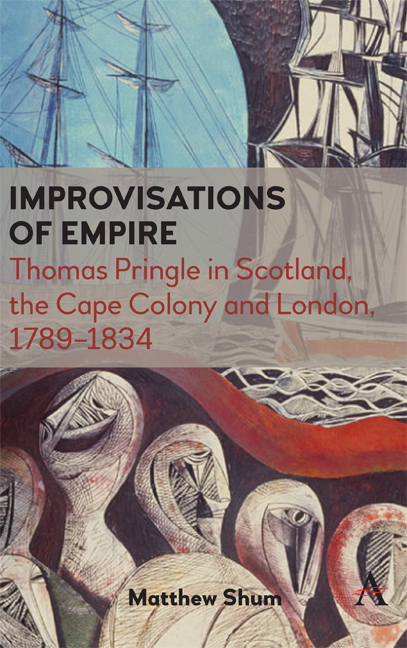Summary
When Pringle arrived in London in 1826, he entered a social, political and cultural formation considerably removed from the sparse and abrasive ethos of the Cape Colony. He had now to negotiate a more complex, if less threatening, terrain, and his means of negotiation was a professional engagement with print culture— as journalist, pamphleteer, poet, editor and, most prominently, as Secretary to the Anti-Slavery Society. In the mid-1820s, print politics and print culture in Britain were characterized by significant divisions, the most salient of which was that between a “democratic” political establishment, which, however divided within its own ranks, regarded parliament and constitutional reform as constituting the only legitimate form of politics, and dispersed but still articulate proponents of radical reform who wished, in various ways, fundamentally to transform existing political structures. Pringle had come from an anachronistic colonial situation in which print dissemination was limited and print control despotically vested in the hands of a single individual; in this context, the right to print was granted to none but the most direct government functionaries and the battle fought by Pringle and Fairbairn had been to extend this right to an emergent colonial middle class. If such a move constituted, in condensed form— and with the obvious limitations of a racially divided colonial state— a replay of the classic eighteenth-century Enlightenment scenario of the opening of a public sphere in the waning absolutist state, then the situation that Pringle encountered in 1826 was very different. As Kevin Gilmartin explains, disparate radical groupings were united in their conviction that the state and its civil institutions were irreparably compromised and that “the press and opinion were no longer counterposed to the absolutist state, as in the classic bourgeois public sphere, but were instead divided between a corrupt state and the advocates of reform” (1996, 23). This split reproduced itself in the broad configuration of the reading public as well, resulting, as Jon Klancher notes, in “not a single but two national reading publics, implacably opposed in their language and politics” (1987, 98).
- Type
- Chapter
- Information
- Improvisations of EmpireThomas Pringle in Scotland, the Cape Colony and London, 1789–1834, pp. 133 - 198Publisher: Anthem PressPrint publication year: 2020



